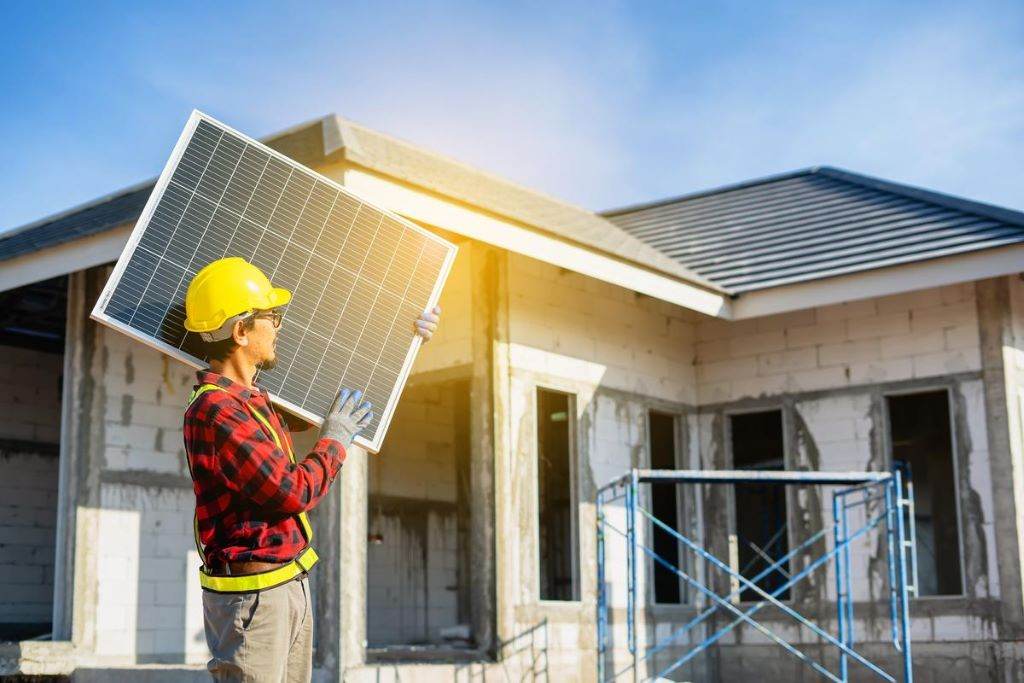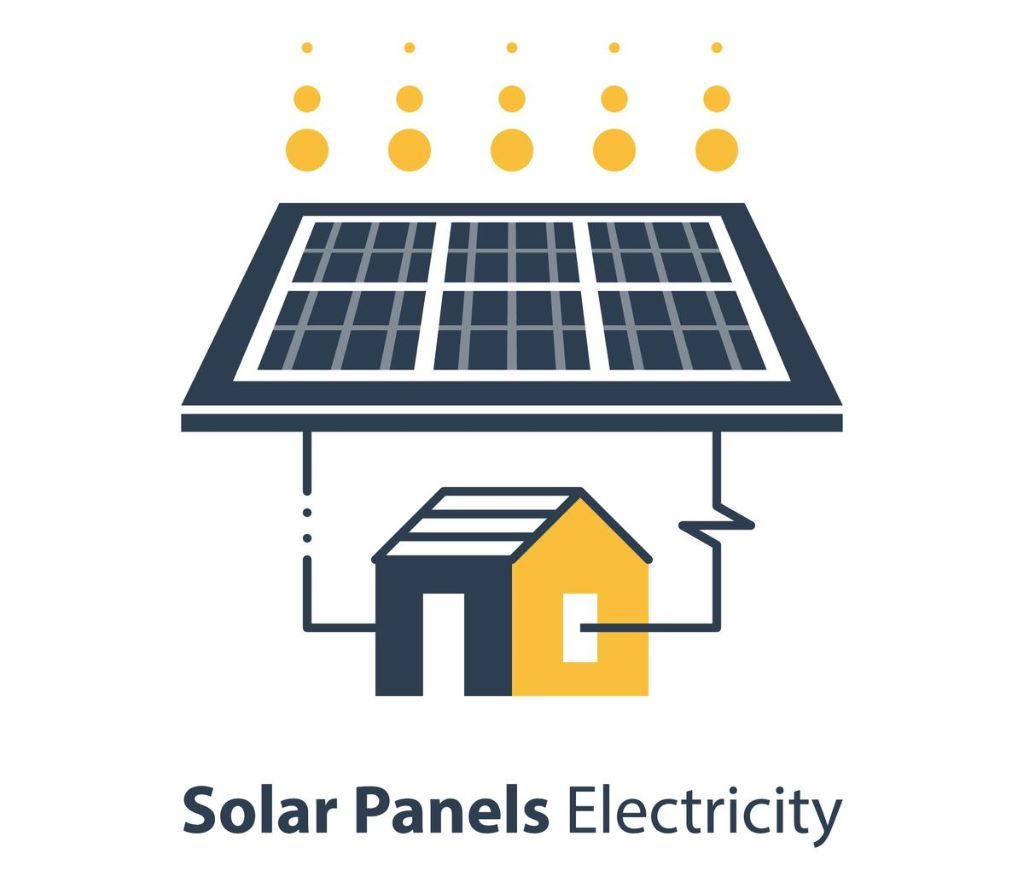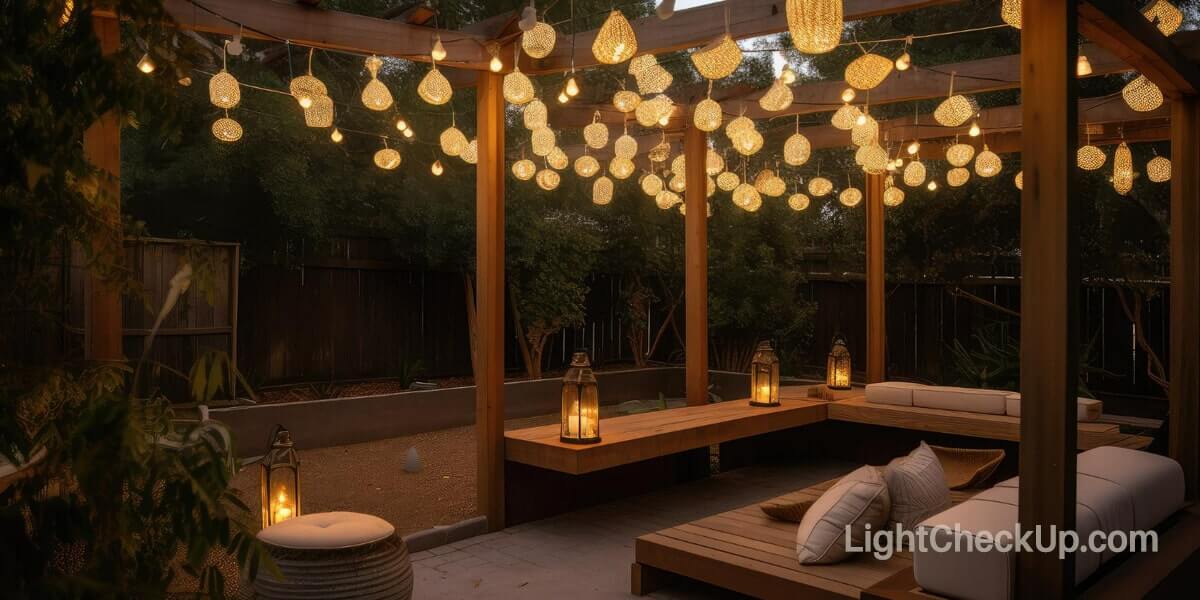How do solar panels work on a house? This renewable energy is safe enough to be used repeatedly to keep homes running. Solar panels use the photovoltaic effect to turn sunlight into electricity. Solar cells generate electricity from sunlight.
Solar panels can be mounted on roofs or yards. Solar panels linked to an inverter transform direct current (DC) into alternating current (AC) to run appliances and other electrical loads.
Solar panels reduce home energy costs and carbon emissions. Buy them if you want to save money and the environment.
Key Takeaways
- Solar panels use photovoltaics to make electricity.
- PV systems have batteries, inverters, and solar panels.
- Solar panels work on a house to reduce carbon emissions and energy costs.
How do solar panels work on a house?
Solar panels use photovoltaics to generate electricity. The panels consist of silicon-based photovoltaic (PV) cells. When sunlight hits PV cells, it causes electrons to break away from the silicon atoms and flow through the cells. This flow of electrons produces direct-current (DC) electricity.
Direct Current to Alternating Current
Solar panels work on a house to make DC electricity, which is different from what most homes and buildings use. The energy needs to be changed into alternating current (AC) before it can be used.
This is done with the help of an inverter, which is usually put in your home near the electrical panel. The transformer changes the DC power from the solar panels into AC power that can be used to power your home.
Feeding the electrical grid
If your solar panels produce more electricity than your home needs, you can send the extra energy back into the power grid. This uses “net metering”. With net metering, if your solar panels work on a house and produce more energy than you need, you can get a credit on your electricity bill.
Read Also: Solar Light Not Working: How To Fix Solar Light Sensor?
When your solar panels aren’t producing enough energy, you can use these points to pay for the power you use from the grid.
Solar panels make clean, renewable energy, which reduces our carbon footprint. You need to know how they work helps you choose them for your home.
Benefits and drawbacks of solar energy
Solar energy is becoming more and more popular as a renewable and sustainable energy source for homes. But before buying solar panels work on a house, you should think about both the pros and cons.

Environmental Impact
Solar energy’s benefits for the environment are incredible. They provide power without polluting or producing greenhouse gases. Solar power fights climate change and carbon emissions.
Read Also: Here Is The Secret: How Long Do Solar Lights Last?
Cost and Savings
Solar panels are costly, but they pay off in the long run. Solar panels work on a house may lower your monthly power costs by producing electricity. Many governments provide solar panel incentives and tax credits to reduce initial costs.
However, solar energy’s cost and savings depend on your home’s size, energy use, and local power rates.
Read Also: Fixing Solar Lights With Nail Polish: Quick And Easy Tips
Reliability and Maintenance
Solar panels last for decades with minimal maintenance. They are strong enough to withstand hail and snow. Since solar panels work on a house with no moving components, mechanical failure is less likely.

They need maintenance to work properly. This involves periodically cleaning the panels to eliminate dirt and debris that might impair their efficiency. To maintain proper operation, have a professional examine your solar panels frequently.
What is solar energy?
Solar energy is renewable. It comes from the sun. Solar panels are made to take in sunlight and turn it into electricity that can be used to power your home.
It captures sunlight and converts it into electricity for your home. You should know how solar panels work on a house to decide if solar energy is right for you.
How does sunlight create electricity?
Solar panels use sunlight to create electricity. They are made up of photovoltaic cells that are designed to capture sunlight.

When sunlight hits photovoltaic cells in solar panels, the light is absorbed. When energy from the sun hits a cell, it creates electrical charges. These charges move in response to an electrical field inside the cell. This makes electricity flow.
Solar cells and photovoltaic effects
The method solar cells use to turn sunlight into electricity is known as the photovoltaic effect. The photovoltaic cells are made of layers of the semiconducting material silicon. When sunlight hits the silicon, it knocks electrons off of the atoms.
This electron collection is then used by the cell’s electrical field to generate current.
How do solar panels work with your electric bill?
Solar cells are connected to form solar panels. When more solar cells are linked together, the solar panel generates more energy. A solar panel’s wattage indicates its electricity output.

The solar panel’s inverter converts DC electricity into AC electricity for your home. You can use the AC electricity in your home’s electrical panel to power lights and appliances.
Read Also: Troubleshooting Solar Panels On Tile Roof Problems
What’s in a solar panel system?
A solar panel system in a home is made up of several parts. If you know about these parts, you can make smart decisions about your solar panel system.
Solar Panels
Solar panel systems are mainly famous for their panels. So how do solar panels work on a house? PV cells convert sunlight into DC power.

Your energy demands and roof dimensions determine how many solar panels you need. Solar panels are usually positioned on the roof but may be ground-mounted.
Inverters
Solar panel systems need inverters. They convert solar panel-generated DC power into AC electricity for your home. There are two basic kinds of inverters: string and micro.
While cheaper, string inverters may be less efficient and need more maintenance.
Although more costly, microinverters are more efficient and need less maintenance.
Mounting Equipment
Solar panels work on a house are mounted to the roof or ground using mounting equipment. Mounting equipment includes roof, ground, and pole mounts.
The mounting equipment you require depends on your roof or ground type, solar panel system size, and local building regulations.
Batteries
Batteries are optional for solar panels. They store excess solar energy for use at night. Batteries may lessen grid dependence and offer backup power during outages. Batteries may be costly and need upkeep.
Solar panels use many parts to produce power from the sun. If you are familiar with these parts, you can increase the effectiveness of your solar panel system.
Read Also: How To Make A Solar Panel With Aluminum Foil: Simple Steps Want To Try It At Home?
How do I install solar panels on a house?
Solar panel installation in your home requires some careful planning.
First, you should look for a professional installer who can advise you on the optimal location for your panels. They’ll consider your roof’s orientation, sunlight, and shading, which may affect panel performance.

After helping you choose panel placement, your installer will install them. You can secure roof panels with mounting brackets and drill holes for wiring.
Solar panel orientation matters while installing them. Your solar panels work on a house should face the true south (northern hemisphere) or the true north (southern hemisphere) to optimize energy production. So your panels get direct sunlight all day.
Read Also: How To Install And Maintain Your 405w Solar Panel: Tips From The Pros
In addition to orientation, panel angle affects performance. The best solar panels work on a house depend on location and season. Based on your location and roof sunlight, your installer may help you choose the ideal panel angle.
Solar panels perform best when installed and aligned properly. You can get years of clean, renewable energy if you hire a professional installer and angle your panels.
How does sunlight affect solar panel performance?
Solar panels generate electricity from sunlight. So it’s important to maximize their sun exposure.
How Solar Panels Work On A House? several factors affect solar panel efficiency:
Solar panels work best between 59 and 95 degrees Fahrenheit. When panels get too hot, their efficiency decreases.
A solar panel’s efficiency can be rated by its type. The best panels can convert up to 23% of sunlight into electricity.
Solar panels don’t work as well in the shade. This is because solar panels need sunlight to generate electricity.
If part of a solar panel is shaded, the entire panel becomes less efficient. Even partial shading can significantly reduce the amount of electricity a solar panel produces.
You can install solar panels in a sunny spot. Try to keep far from trees or any obstructions.
FAQ | Solar panels work on a house.
What is the average cost of installing solar panels on a house?
Solar panels work on a house; installation costs depend on the size, type, and location of the panels.
According to EnergySage, the average cost of a 6 kW solar panel system is between $14,000 and $18,000 before tax credits. But it’s important to know that incentives and rebates may be available to help lower the cost of installation.
How many solar panels power a typical home?
The number of solar panels needed to power a typical home depends on its energy usage and panel size. Solar.com estimates that a 6 kW solar panel system needs 20 to 24 panels, depending on their power.
How does solar power work for residential homes?
Solar panels turn sunlight into energy. The panels use photovoltaic cells to convert sunlight into DC power. For use in households, an inverter converts DC electricity to AC energy.
Can solar panels provide enough power for a home to run off-grid?
The size of the solar panel system and the household’s energy use determine whether solar panels can power an off-grid residence. Treehugger says a typical off-grid solar panel setup needs a battery bank to store surplus power during low sunshine.
Does the government provide free solar panels for low-income families?
How to get free solar panels from the government. Some government solar panel programs offer free or low-cost solar panels for low-income families, such as the Low-Income Home Energy Assistance Program (LIHEAP) and the Weatherization Assistance Program (WAP).
But depending on the state and the program, eligibility standards and availability might change.
Is it worth investing in solar panels for a home?
If solar panels are worth it, consider power costs, sunlight, and energy use. Solar panels may lower power bills and offer steady energy. But Renogy advises weighing the pros and cons before installing them.
Read Also: Do Solar Lights Work In Winter? How To Keep Them Working!!








